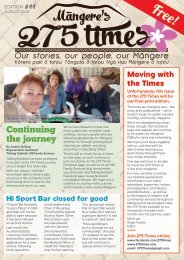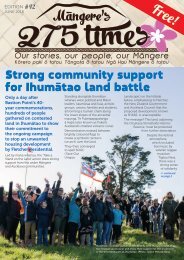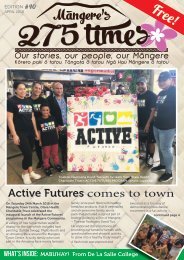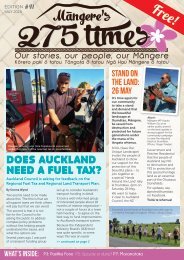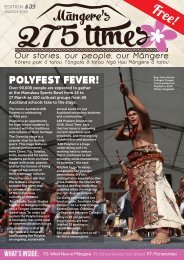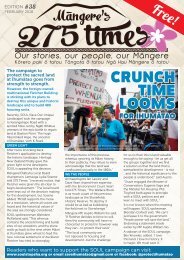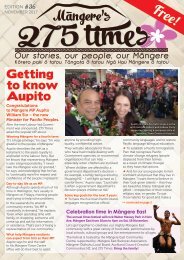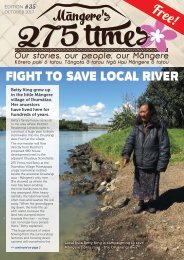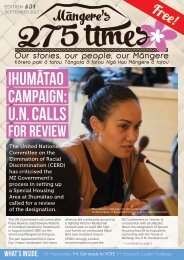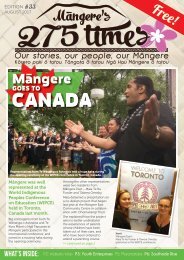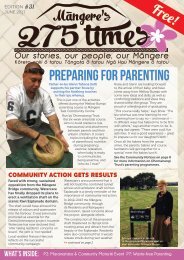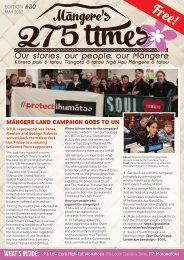275 Times July 2017
Mangere community news. In this month's issue, read more about: matariki, Mangere's history, La Coco, young leaders at Bader Intermediate, Ihumatao, Tigi's guitar and the Love Zero Waste Awards.
Mangere community news. In this month's issue, read more about: matariki, Mangere's history, La Coco, young leaders at Bader Intermediate, Ihumatao, Tigi's guitar and the Love Zero Waste Awards.
You also want an ePaper? Increase the reach of your titles
YUMPU automatically turns print PDFs into web optimized ePapers that Google loves.
PLAN TO BREAK IHUMĀTAO DEADLOCK<br />
>> cont. from page 1<br />
amount, we then have our starting<br />
point for serious negotiations<br />
with the Government.”<br />
SOUL’s submission called on<br />
the Māngere-Ōtāhuhu Local<br />
Board to hold urgent discussions<br />
with the Government, Auckland<br />
Council, Auckland Airport, and<br />
mana whenua, to put together<br />
a combined offer of purchase<br />
(estimated at up to $30 million)<br />
to Fletcher Residential, to acquire<br />
and safeguard the land.<br />
The Local Board was also asked<br />
to include an appropriate amount<br />
as a budget item in the Long<br />
Term Plan <strong>2017</strong> for this purpose.<br />
The proposed multi-source<br />
purchase offer would be considered<br />
a revival of the former Manukau<br />
City Council’s uncompleted<br />
project to establish and protect<br />
the landscape as the Māngere<br />
Gateway Heritage Area.<br />
The proposal noted that the<br />
Gateway Heritage project was<br />
“developed in full consultation with<br />
local communities including mana<br />
whenua.” And as the inheritor of<br />
the project, the Local Board takes<br />
on the duties of its “protector<br />
and champion.” Chair Lemauga<br />
Lydia Sosene stresses the need to<br />
“protect and preserve” the land.<br />
The submission also noted that the<br />
Manukau City Council shareholding<br />
in Auckland Airport was retained<br />
when many other Local Bodies sold.<br />
These shares, which are now<br />
controlled by Auckland Council,<br />
generate approximately $10 million<br />
per year. SOUL proposes that –<br />
combined with other funds – “this<br />
revenue source be allocated for the<br />
purchase of the Wallace Block and<br />
the ongoing development of the<br />
Māngere Heritage Gateway Area.”<br />
The Māngere-Ōtāhuhu Local<br />
Board received SOUL’s submission<br />
and reiterated its long-standing<br />
opposition to the SHA62<br />
housing plan at Ihumātao.<br />
Lawyer Louis Te Kani and SOUL’s<br />
Pania Newton, defend SOUL’s injunction<br />
move in the Māori Land Court.<br />
IHUMĀTAO: WAITANGI TRIBUNAL<br />
While awaiting a Waitangi Tribunal<br />
hearing on the Ihumātao dispute, SOUL<br />
has applied for an interim injunction<br />
to halt Fletcher’s development plans.<br />
The injunction centres on the legality<br />
of Fletcher buying confiscated land.<br />
On 26 June, Fletcher and the<br />
Auckland Council asked the Māori<br />
Land Court in Whangarei to “strike<br />
down” SOUL’s injunction before it<br />
even had a chance to be heard.<br />
A strong SOUL contingent supported<br />
lawyer Louis Te Kani who argued for<br />
the right for the injunction to proceed.<br />
The judge reserved his decision.<br />
History<br />
under our feet<br />
THE GREAT NZ WAR<br />
IN MĀNGERE<br />
By Farrell Cleary<br />
Historian Vincent O’Malley<br />
brought our little-known<br />
history to life when he<br />
spoke to an audience of<br />
150 at Māngere Bridge<br />
Primary School recently.<br />
In conversation with<br />
archaeologist Dave<br />
Veart, Vincent provided<br />
a fresh and enlightening<br />
perspective on the invasion<br />
of the Waikato by British<br />
troops in <strong>July</strong>, 1863.<br />
To an attentive audience<br />
– many of whom are<br />
involved in the campaign<br />
to save confiscated<br />
land at Ihumātao from<br />
development by Fletcher<br />
Residential – Vincent<br />
explained the background<br />
to the confiscations that<br />
followed the invasion.<br />
Setting out one thesis of his<br />
new book “The Great War for<br />
New Zealand 1863–2000”,<br />
Vincent explained that the<br />
Waikato War was started<br />
by Governor George<br />
Grey and a settler<br />
government led<br />
by speculators<br />
hungry for<br />
Māori land.<br />
“WHY HAVEN’T WE<br />
LEARNED ABOUT<br />
THIS BEFORE?”<br />
The<br />
government<br />
lied<br />
about a socalled<br />
Māori plan<br />
to attack Auckland<br />
and used that lie as<br />
false justification for the<br />
invasion and subsequent<br />
confiscation of huge<br />
swathes of land from<br />
Māngere to Maungatautari.<br />
Vincent showed that the<br />
Proclamation justifying the<br />
invasion was not issued<br />
until after the troops had<br />
moved onto Māori land<br />
in South Auckland.<br />
The invasion destroyed a<br />
dynamic Māori economy<br />
which supplied the growing<br />
colony of Auckland.<br />
Māori grew wheat at<br />
places like Ihumātao and<br />
Rangiaowhia. St James’<br />
Church in Māngere Bridge<br />
was built by Pōtatau, the<br />
first Māori King, whose<br />
protection of the infant<br />
colony was rewarded<br />
by conquest and ruin.<br />
It has only been in the last<br />
30 years that research by<br />
Vincent and other historians<br />
has laid the foundations<br />
for Waitangi Tribunal and<br />
government acceptance<br />
that the war was a war<br />
of invasion and that the<br />
confiscations were theft.<br />
Vincent reports that the<br />
response to his book<br />
has been powerful<br />
and positive.<br />
One Waikato farmer,<br />
a descendant<br />
of a recipient of<br />
land confiscated<br />
from Māori, asked<br />
him, “Why haven’t<br />
we learned about<br />
this before?”<br />
Stephanie Tawha, principal<br />
of Māngere Bridge School,<br />
gave a warm mihi to<br />
Vincent and Dave, and<br />
led a spirited waiata to<br />
close the evening.<br />
Vincent’s important<br />
book is available from<br />
book shops and at<br />
Auckland Libraries.<br />
Above: Historian and author<br />
Vincent O’Malley (left) and<br />
archaeologist Dave Veart reveal<br />
the history of Māngere.<br />
2



